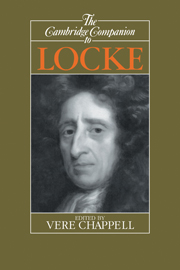Book contents
- Frontmatter
- Introduction
- 1 Locke's life and times
- 2 Locke's theory of ideas
- 3 Locke's philosophy of body
- 4 Locke's philosophy of mind
- 5 Locke's philosophy of language
- 6 Locke's theory of knowledge
- 7 Locke's philosophy of religion
- 8 Locke's moral philosophy
- 9 Locke's political philosophy
- 10 Locke's influence
- Bibliography
- Index
1 - Locke's life and times
Published online by Cambridge University Press: 28 May 2006
- Frontmatter
- Introduction
- 1 Locke's life and times
- 2 Locke's theory of ideas
- 3 Locke's philosophy of body
- 4 Locke's philosophy of mind
- 5 Locke's philosophy of language
- 6 Locke's theory of knowledge
- 7 Locke's philosophy of religion
- 8 Locke's moral philosophy
- 9 Locke's political philosophy
- 10 Locke's influence
- Bibliography
- Index
Summary
John Locke was born on August 28, 1632, into a family of very minor Somerset gentry. His father, John Locke senior, owned some houses and land in and around Pensford, a small town some seven miles south of Bristol. He supplemented his income from this by practicing as an attorney and by taking a series of minor administrative posts in local government.
Locke's family seems to have had puritan sympathies, and after the outbreak of the Civil War his father served as a captain in one of the parliamentary armies, in a cavalry regiment commanded by a very much more substantial figure among the Somerset gentry, Alexander Popham. Popham's regiment served under Waller, was defeated at the Battle of Devizes in July 1643, and subsequently dispersed.
Locke's father's association with Popham, whom he continued to serve in his professional capacity and from whom he leased part of his land, had one consequence of enormous benefit to his son. Popham, since 1645 the member of Parliament for Bath, had sufficient influence to recommend boys for places at Westminster School, at that time the foremost school in England. Locke entered Westminster in 1647. The education there was centered almost entirely around the ancient languages, first Latin, then Greek, and finally, for the most academically proficient pupils, Hebrew. Locke made sufficient progress with the last of these to be able to compose an oration in Hebrew shortly before he left the school.
- Type
- Chapter
- Information
- The Cambridge Companion to Locke , pp. 5 - 25Publisher: Cambridge University PressPrint publication year: 1994
- 6
- Cited by

